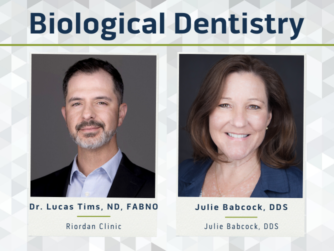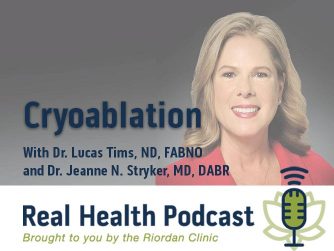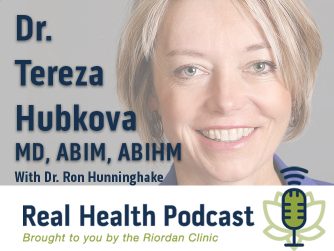In this episode, Dr. Ron sits down with NUCCA Chiropractor Dr. Traci Grandfield. At Live Well Spinal Care, Dr. Grandfield focuses specifically on the upper cervical ( the upper neck) region of the spine using NUCCA (“nu-kah”). NUCCA is an advanced, specialized Chiropractic technique that follows a proven method of measuring and correcting upper cervical misalignments with an extremely gentle and precise adjustment.
Thank You To This Episode’s Sponsor
Episode Links and Promotions
Dr. Traci’s Website https://www.livewellspinalcare.com/
https://www.facebook.com/livewellspinalcare
Free initial consultation with Dr. Traci at Live Well Spinal Care
15% off the new patient exam and initial NUCCA specific xrays
Episode Transcripts
Disclaimer: The information contained on the Real Health podcast and the resources mentioned are for educational purposes only. They are not intended as, and shall not be understood or construed as, medical or health advice. The information contained on this podcast is not a substitute for medical or health advice from a professional who is aware of the facts and circumstances of your individual situation. Information provided by hosts and guests on the Real Health podcast, or the use of any products or services mentioned, does not create a practitioner patient relationship between you and any persons affiliated with this podcast.
Intro: This is the Real Health podcast brought to you by Riordan Clinic. Our mission is to bring you the latest information and top experts in functional and integrative medicine to help you make informed decisions on your path to real health.
Dr. Ron Hunninghake: Well, welcome everyone. It’s Dr. Ron Hunninghake from the Riordan Clinic, and this is another episode of Real Health. As my guest, I have Dr. Traci Grandfield, who is a NUCCA chiropractor. We thought today we would explore this different type of chiropractic, and yet it’s still chiropractic, and see if we can discover ways that possibly those of you who are listening in can improve not only your physical health, but your mental health as well because after all the brain is connected to the rest of the body. We have to have a good connection, is that right, Traci?
Dr. Traci Grandfield: Goes back and forth.
Dr. Ron Hunninghake: Yeah.
Dr. Traci Grandfield: Yeah, when your body’s not well, your brain won’t process emotion quite as well either.
Dr. Ron Hunninghake: Yeah. So you’re a native Wichita gal.
Dr. Traci Grandfield: Grew up, went to Maize, went to KU. I never thought I’d circle back, but I circled back home, and it feels really good.
Dr. Ron Hunninghake: This is a good way… You’re a chiropractor and I’m sure there are people that are listening are already thinking, “Well, what is NUCCA chiropractic?” Maybe you can tell me a little bit about how you thought you’d become a chiropractor, but then how did that evolve into NUCCA chiropractic?
Dr. Traci Grandfield: I originally was going to go to medical school and go into pediatrics. I was premed at KU, and the last semester at KU, I met someone that was going to go to chiropractic school. Through talking with him more, I learned my passion, which was how to help people really heal and being more hands on and working with the body’s innate ability to heal from the inside out. It resonated with me. I went to school not knowing anything about chiropractic. In fact, when I was growing up we’d pass a chiropractic office, I would ask my mom, and she said, “Oh, that’s where you go when you get into a car accident, and they crack your back.” I never thought anything of it. That didn’t sound appealing to me, but learning how to truly help people improve their health sounds amazing.
Dr. Traci Grandfield: I went to school in the Bay Area at Life Chiropractic College West. There, they had a philosophy of teaching not only the art of chiropractic, but the science and the philosophy. They gave us a lot more technique options. I learned the traditional way of adjusting and why we do it and how we find where in the body needs to be adjusted, but it was never satisfying enough to me. I wanted to have more objective answers as to when and how to adjust and whether my adjustments were actually making a difference. Towards the end of the curriculum, I had a class, a NUCCA class. It’s a technique that there’s only about 280 doctors in the world practicing it. It’s a specialty, but there’s a lot of measurement before an adjustment is ever made to determine what the misalignment is and then with the adjustment… Go ahead.
Dr. Ron Hunninghake: Well, this is where I want to tell the audience that I’ve been going to Traci for what? A year and a half, two years now. I was a defensive end in high school. Back then, they taught us to do the tackles where you put your head into it. I think I got bonged in the head too many times. I knew that something about the neck was going to be really important. After our initial visit with the x-rays and everything, every time I go in, Traci does this very elaborate kind of testing to see whether or not my head is on straight. A lot of times it isn’t. So tell us a little bit about how this helps you do your job.
Dr. Traci Grandfield: Right. I was listening to one of your podcasts, and you mentioned Dr. Riordan saying that unless you measure something, you can’t manage it. NUCCA was created in order to measure and create a more reproducible and reliable way of reducing the misalignment and opening up the nervous system to function properly again. So also developed the Anatometer. It’s a machine that you stand on, and it measures the postural distortion. When your head is on straight, your body is able to balance and coordinate not only internally, but externally. If you’re out of alignment, it shows and people often fall into the same pattern compensations. I look for your pattern if that’s showing up and then also a leg length check that is very, very precise. There’s a couple other ways for me to determine if someone’s out of alignment, but if you’re not out of alignment, you don’t get adjusted.
Dr. Ron Hunninghake: Yeah. Sometimes I’m a good boy and everything is straight, but it’s not always. One of the things you told me one time is that there are a number of nervous system receptors on the first vertebrae. Tell the audience a little bit about that.
Dr. Traci Grandfield: That’s right. We have receptors around every joint in the body. They’re called proprioceptors. That’s why you can close your eyes and touch your finger to your nose without seeing it, but there are 400 times more proprioceptors around that first cervical vertebra. The reason for that is if that joint is out of alignment, it compromises your survival. It’s a huge threat to the way your body functions, so it can interfere with breathing. It can interfere with blood pressure, sight. If it’s out of alignment, those receptors are responsible to tell the brain there’s a problem. That can turn into the stress signal that turns into a constant fight or flight, anxiety, depression. There’s so many things that trickle down from that.
Dr. Ron Hunninghake: Yeah. If your head’s not on straight, your spine and the rest of your body will try to compensate. Oftentimes it’s a mal adaptation to this imbalance. Just correcting things down doesn’t really solve it at the root of the problem.
Dr. Traci Grandfield: Yeah, it’s more about freeing up the body’s best chance at health and wellness and opening up the nervous system interference that happens right there at the very first cervical vertebra. You have that brain stem turning into the spinal cord right there. There’s a million different ways it can affect someone’s health, and most of them are not perceivable or conscious level until they’ve been going on for many years. Then it’s really hard and difficult to reverse.
Advertisement: There’s a lot more to this conversation, and it’s coming up right after a quick break.
Today’s episode of the Real Health podcast is brought to you by the Riordan Clinic Nutrient Store. The Nutrient Store is your resource for the highest quality nutritional supplements. Every supplement in the store is hand picked by the expert medical staff at Riordan Clinic, providing you with the best quality, purity, consistency, and effective dosing available. Visit store.riordanclinic.org to shop online.
Dr. Ron Hunninghake: I had attended a conference on functional medicine, and a doctor that I very much admired could not say enough good things about NUCCA because he had been working with all kinds of nutritional and other functional modalities and had made a lot of progress, but just couldn’t get over the hump. But when the patients went in and had this very fundamental adjustment done, things that weren’t healing were able to heal. So I thought I needed to try this out. This was a couple years ago. You must have just gotten into town.
Dr. Traci Grandfield: I did. I just started up, and I got a call from your nurse and said, “Dr. Ron would like to come and see you.” I thought, “Who is this guy?”
Dr. Ron Hunninghake: “Who is this guy?”
Dr. Traci Grandfield: “What does he want?” It turned out to be a really great relationship because even though I can clear the nervous system and the body’s ability to heal, usually by that time there’s so much breakdown in other body systems, whether it’s nutritionally or many years of emotional anxiety that comes with it with some people, that they need other practitioners to support them in those facets.
Dr. Ron Hunninghake: The other thing about NUCCA chiropractic that I think it’s somewhat of… Maybe it’s a concern that a lot of doctors have is that many chiropractors do a kind of high velocity neck adjustment that looks kind of scary to us. I was pleased to know that this is a very, very gentle adjustment. I mean, truth be known, it almost seems like…
Dr. Traci Grandfield: Nothing.
Dr. Ron Hunninghake: Nothing.
Dr. Traci Grandfield: I have a lot of people say that too.
Dr. Ron Hunninghake: Yeah. That’s very reassuring. Where’s your office at here in Wichita?
Dr. Traci Grandfield: My office is at Central and Oliver it’s Live Well Spinal Care, and I’m the only practitioner there right now.
Dr. Ron Hunninghake: And you’re the only practitioner in Wichita.
Dr. Traci Grandfield: Oh, right. There is not another NUCCA doctor practicing this specific technique for three hours. Tulsa would be the closest NUCCA doctor. Now in chiropractic, there are many, many techniques, whether adjusting full spine or being an upper cervical specific technique. NUCCA is an upper cervical specific technique, but there are other ways of precisely analyzing and adjusting. Those doctors, that’s what they dedicate their practice to. Those doctors are pretty far and few between as well.
Dr. Ron Hunninghake: I was impressed when I heard that you take the time to drive that three hours in order to get yourself adjusted.
Dr. Traci Grandfield: I practice what I preach.
Dr. Ron Hunninghake: There you go, yeah.
Dr. Traci Grandfield: It’s worth it. I don’t feel the same.
Dr. Ron Hunninghake: That’s wonderful. I’m just pleased that you’re here. We usually like end up talking about real health since this is the Real Health podcast. To you, what has made the… I see also that you are a fitness instructor. Tell us a little bit about what real health means to you.
Dr. Traci Grandfield: Thank you for bringing that up. Yeah. I try to practice… I became a chiropractor mostly because I was more importantly wondering how to be the healthiest I could be. I’m always a why person, why this and why that. Going through school and learning that all that I’ve learned, eating well and drinking enough water and exercise, as well as your spiritual and mental health. That’s become more of a focus for me.
Dr. Traci Grandfield: In these later years in my practice realizing that patients that aren’t getting well, that’s a piece that’s missing for them, but that’s not something that’s so mainstream. People don’t recognize that as being… Or don’t give it the credit. It can have effect on your health. I teach classes at Opti-Life. I teach anywhere from two to four days a week as my part-time fun job, my happy place, but real health is just trying to constantly work on all those facets of health, whether it’s sleep nutrition, diet, having a purpose, having family. That’s why I moved back to Wichita is actually to be closer to my brother and sister and my mom and my grandmother. That’s real health to me.
Dr. Ron Hunninghake: I actually wanted to become a co learner. I didn’t really know the term when I first joined with Dr. Riordan, but I realized that as I worked with patients with that kind of mindset, I was learning all kinds of new things and the nuances of new things because achieving real health is not just changing one thing. It’s a step-by-step process of learning how your unique body and physiology is adapting to this very stressful, hard to live in world these days.
Dr. Ron Hunninghake: I knew I had to be open to new possibilities because the standard medical point of view is all about just fixing parts and not necessarily taking care of the whole person, but you do have to pay attention to parts, and you have to do your due diligence in terms of addressing symptoms and looking for root causes. That’s why I searched you out because I knew I had this history of upper back pain and trauma to my head and neck. It was just another opportunity for me to learn more about taking care of the physical body and at the same time enlarging my own perspective.
Dr. Traci Grandfield: How did you end up at Riordan Clinic? You think differently than a lot of other medical doctors. Is that because you were drawn here for the more holistic approach or did that evolve over the years of you being here?
Dr. Ron Hunninghake: No, I went into medicine wanting to learn more about health. I was into food and exercise and meditation and all those kinds of things. So I went to medical school thinking I would learn about holistic health, even though I didn’t even know the word holistic at that time. But medicine, like I said, is more of a focused phenomenon that deals with symptom and making diagnosis, but not necessarily thinking about what the whole person needs. It’s just not set up that way. I mean, that’s why you have so many medical specialists, so it’s kind of neat to have you on Real Health because you’re a specialist, but yet because this part of the body is so fundamental to the functioning of the rest of the body, by correcting any deviation.
Dr. Traci Grandfield: Misalignment.
Dr. Ron Hunninghake: Yeah. You’re correcting a bunch of things that propagates down into the body.
Dr. Traci Grandfield: Open up the pathways at other treatments or support to someone’s health actually starts to get some traction and make progress because the body is online again.
Dr. Ron Hunninghake: Yeah. I think the beauty of what we’re talking about here is that our listeners are also co learners. They’re also looking for real health, and part of that is a discovery process. I’m interested in learning how to do new things or send people to people who can help them correct fundamental imbalances or maladjustments in a way that they can express a greater level of real health in their lives. Any last words?
Dr. Traci Grandfield: No, I share that passion with you, and I appreciate you so much for having me today.
Dr. Ron Hunninghake: Well, thank you, Traci. Because you’re on Real Health, you have some opportunities for people to take advantage of your services.
Dr. Traci Grandfield: Yeah. I’m always looking to attract people that want to get themselves taken care of on another level. So I’m offering the free initial consultation and then a 15% discount on the new patient exam. If it’s found that they’re out of alignment at that first vertebrae, their Atlas, the initial NUCCA specific x-rays would be 15% off as well. Just mention that you’ve heard the show.
Dr. Ron Hunninghake: All right. Very good. Thank you so much, Traci.
Dr. Traci Grandfield: Yeah.
Dr. Ron Hunninghake: Good luck with you. Hopefully you’ll be seeing some of our listeners.
Dr. Traci Grandfield: Yeah. Thank you very much.
Dr. Ron Hunninghake: Thank you everyone for listening in.
Outro: Thank you for listening to the Real Health podcast. If you enjoy this episode, be sure to subscribe and leave us a review. You can also find all of the episodes and show notes over at realhealthpodcast.org. Also, be sure to visit riordanclinic.org, where you will find hundreds of videos and articles to help you create your own version of Real Health.




